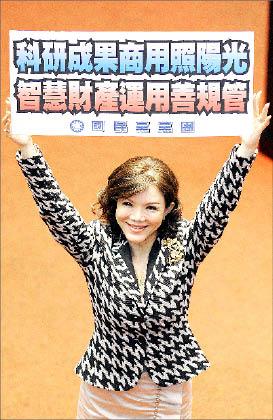The legislature yesterday eased regulations on the transfer of patented technology and the rules on participation by public-payroll researchers in the private sector amid calls to create a friendlier business environment in the ever-intensifying global battle for talent.
“The move will facilitate the return migration of professionals,” Academia Sinica president Wong Chi-huey (翁啟惠) said in response to the passage of the amendment to the Fundamental Act of Science and Technology (科學技術基本法).
The current law stipulates that intellectual property rights (IPR) on projects in the scientific and technological research and development areas subsidized, commissioned or funded by the government belong to the state and are subject to the National Property Act (國有財產法).

Photo: Fang Pin-chao, Taipei Times
Lawmakers agreed to exempt IPRs resulting from research projects at public schools, public research organizations and public enterprises from the National Property Act, meaning the act would not apply to those institutions with regards to the acquisition, management, utilization, disposition and revenue accrued from the rights.
National Science Council Deputy Minister Chen Cheng-hong (陳正宏) said the relaxation of the rule was designed to shorten the time required to transfer patents.
“Currently, the patent application process is a time-consuming process. It usually takes at least one year. By then, there is no market for the outdated technology,” Chen said.
The law was also amended to allow researchers at public schools at the junior level colleges and above, or at public institutions, to acquire more than a 10 percent stake in a company through investment of technology and to double as a member of a board of directors or a board of supervisors at a company.
Currently, researchers on the government payroll are subject to a 10 percent ceiling when acquiring a stake in a company and they are barred from taking up managerial positions in the private sector under the Act Governing the Employment of Educational Personnel (教育人員任用條例).
Chinese Nationalist Party (KMT) Legislator Nancy Chao (趙麗雲) said a statement issued by a group of academic, business and media leaders led by Wong in August urging the government to address a “brain drain” and recruitment difficulties had helped push through the amendment.
Chen said the amendment would help prevent incidents such as that involving Chen Yuan-tsong (陳垣崇), a top researcher credited with developing a drug to treat Pompe disease, who was once suspected of illegally profiting from the transfer and sale of patented technologies.
In June last year, Chen Yuan-tsong, then-director of Academia Sinica’s Institute of Biomedical Science, was charged with corruption over the transfer of drug technology to a company run by his wife.
Chen Yuan-tsong and Academia Sinica denied any wrongdoing. Prosecutors closed the case without indicting Chen Yuan-tsong.

Taiwan is stepping up plans to create self-sufficient supply chains for combat drones and increase foreign orders from the US to counter China’s numerical superiority, a defense official said on Saturday. Commenting on condition of anonymity, the official said the nation’s armed forces are in agreement with US Admiral Samuel Paparo’s assessment that Taiwan’s military must be prepared to turn the nation’s waters into a “hellscape” for the Chinese People’s Liberation Army (PLA). Paparo, the commander of the US Indo-Pacific Command, reiterated the concept during a Congressional hearing in Washington on Wednesday. He first coined the term in a security conference last

Prosecutors today declined to say who was questioned regarding alleged forgery on petitions to recall Democratic Progressive Party (DPP) legislators, after Chinese-language media earlier reported that members of the Chinese Nationalist Party (KMT) Youth League were brought in for questioning. The Ministry of Justice Investigation Bureau confirmed that two people had been questioned, but did not disclose any further information about the ongoing investigation. KMT Youth League members Lee Hsiao-liang (李孝亮) and Liu Szu-yin (劉思吟) — who are leading the effort to recall DPP caucus chief executive Rosalia Wu (吳思瑤) and Legislator Wu Pei-yi (吳沛憶) — both posted on Facebook saying: “I

Sung Chien-liang (宋建樑), who led efforts to recall Democratic Progressive Party (DPP) Legislator Lee Kun-cheng (李坤城), was released on bail of NT$80,000 today amid outcry over his decision to wear a Nazi armband to questioning the night before. Sung arrived at the New Taipei District Prosecutors’ Office for questioning in a recall petition forgery case last night wearing a red armband bearing a swastika, carrying a copy of Adolf Hitler’s Mein Kampf and giving a Nazi salute. Sung left the building at 1:15am without the armband and covering the book with his coat. Lee said today that this is a serious

A mountain blaze that broke out yesterday morning in Yangmingshan National Park was put out after five hours, following multi agency efforts involving dozens of fire trucks and helicopter water drops. The fire might have been sparked by an air quality sensor operated by the National Center for High-Performance Computing, one of the national-level laboratories under the National Applied Research Laboratories, Yangmingshan National Park Headquarters said. The Taipei City Fire Department said the fire, which broke out at about 11am yesterday near the mountainous Xiaoyoukeng (小油坑) Recreation Area was extinguished at 4:32pm. It had initially dispatched 72 personnel in four command vehicles, 16